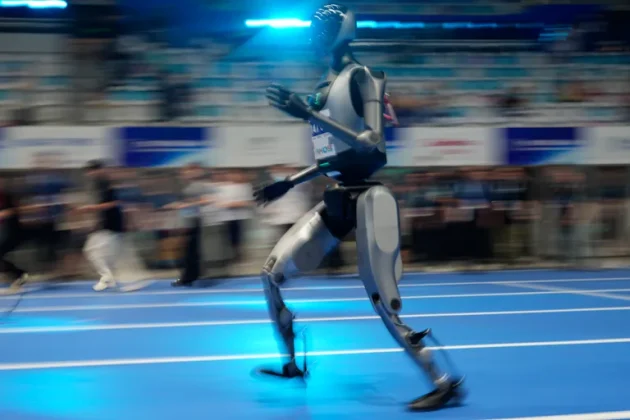BEIJING: At the 2025 World Humanoid Robot Games which just kicked off, China Unicom Beijing provides full 5G-A network coverage outside and inside the event venue — Beijing National Speed Skating Oval.
This cutting-edge network, characterized by its high uplink capacity, reliability, and security, is enabling over 500 robots from nearly 280 teams worldwide to compete at their best across athletic, performance, industrial, and healthcare contests. It is also significantly enhancing the experience for tens of thousands of spectators. Such robust 5G-A networks will transform society by propelling humanoid robots beyond competitions and into full-scale commercialization.
The AI industry is developing rapidly. Multimodal and cross-device interactions are reshaping personal experiences, IoT connections are growing exponentially, and AI is now woven into the fabric of core production processes, completely redefining workflows. These embodied AI robots are a demanding AI application, requiring a specialized network that allows them to perceive their surroundings, make instant decisions, pinpoint their location precisely, and coordinate with other robots.
With the games already in play, China Unicom Beijing is delivering reliable, extensive, and high-uplink connectivity for both robots and spectators outside and inside the arena. Outside, a 5G-A 3D network coordinating 1:1 high and mid bands boosts peak uplink and downlink user-perceived rates to 4 Gbps and 11.2 Gbps, respectively. Inside, LampSite offers 300 MHz bandwidth, achieving a peak network speed of 2.4 Gbps.
“Our 5G-A networks currently serve users, and we’re upgrading them to support embodied AI as well,” said Qin Yang, Deputy General Manager of China Unicom Beijing. “Our 5G-A network for this event reflects this progress. It dedicates a channel for spectators and a dynamically scalable one for robots, realizing seamless connectivity for both spectators and robots even during peak usage. In the robot sector, 5G-A will also be key to enabling low-latency remote control.”
Samuel Chen, Vice President of Marketing for Huawei’s Wireless Network Product Line, said, “At the humanoid robot games, the network must support many robots, spectators, and live media streams. It needs to provide high uplink capacity, low latency, high reliability, and wide coverage.”
Inside the venue, a 5G-A digital indoor system has been developed utilizing 300 MHz ultra-high-bandwidth spectrum. It delivers an uplink speed above 100 Mbps, allowing multiple 4K machine vision streams to be uploaded without frame loss. It also ensures air interface latency remains below 20 ms, so robots can respond to commands instantly.
Outside the venue, a 5G-A 3D network coordinates 1:1 high and low bands to achieve downlink and uplink speeds of 10 Gbps and 4 Gbps, respectively. With this fast connectivity, 8K panoramic cameras merge footage live, media like CCTV upload UHD shallow-compressed signals in seconds, and crowds live stream and share videos without lag.
As the world’s first international sports event for humanoid robots, the games set the stage for a groundbreaking fusion of technology and athletics, signaling AI’s expansion into sports at scale. As the event’s exclusive global communications partner, China Unicom is dedicated to ensuring millisecond-level network response and zero downtime with its 5G-A, AI, and all-optical network expertise through collaboration with partners.
Beyond the event, China Unicom aims to inject strong momentum into the robotics industry. –Agencies




